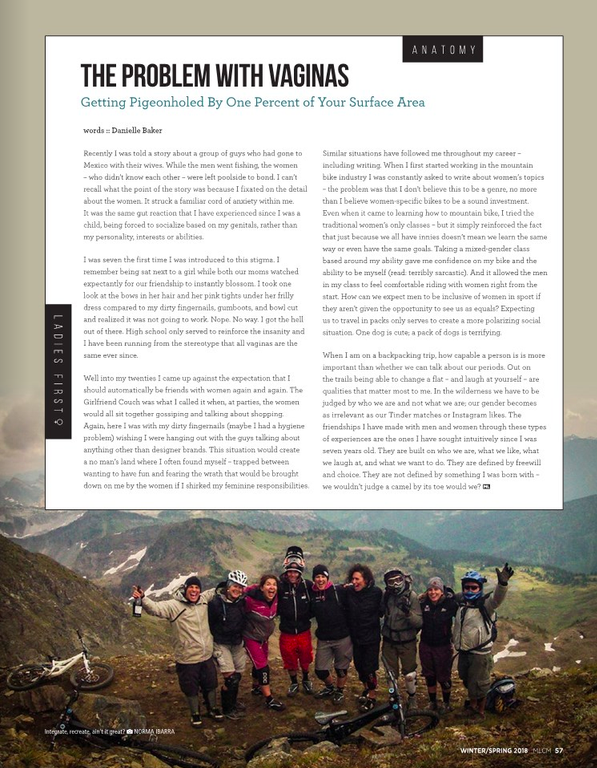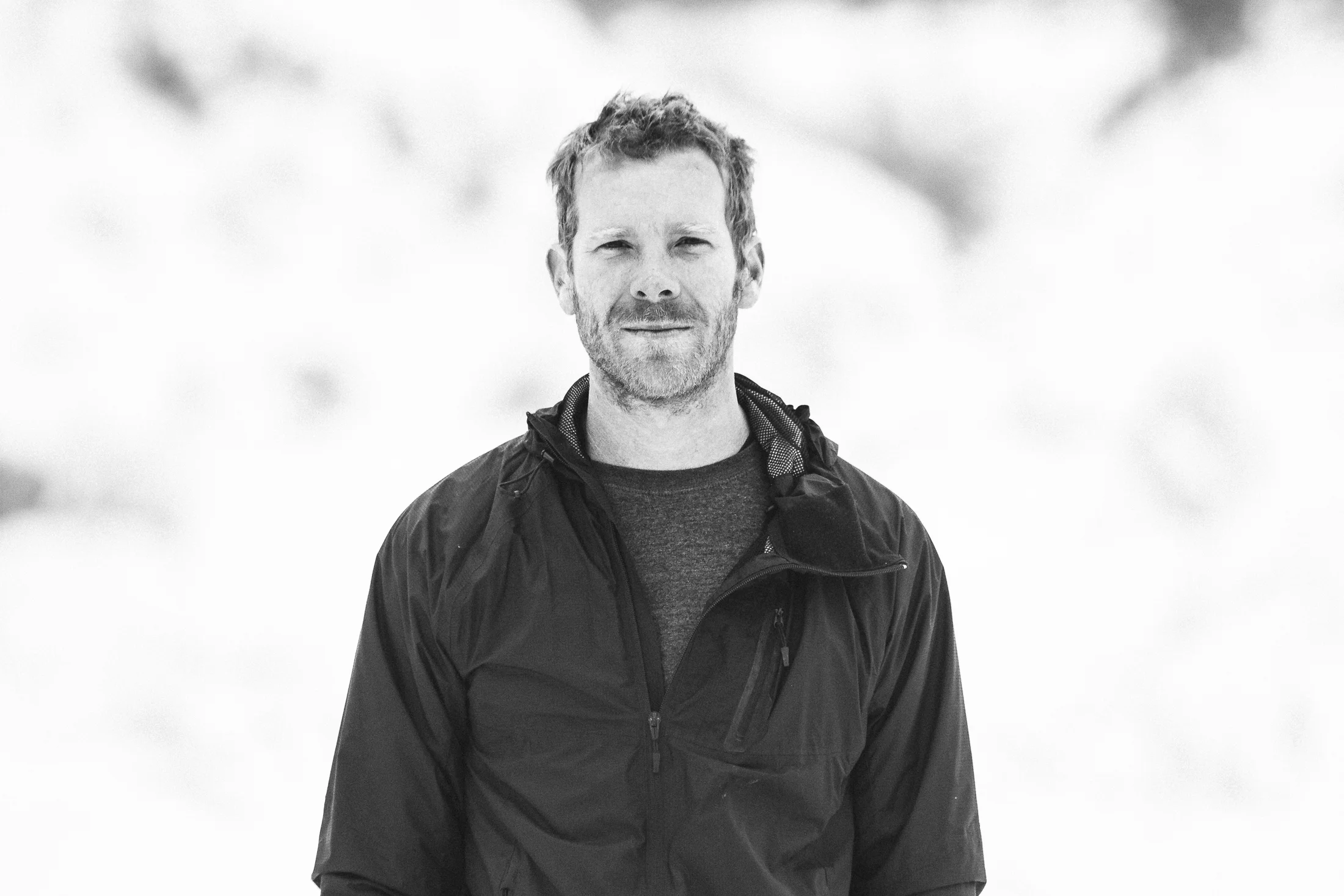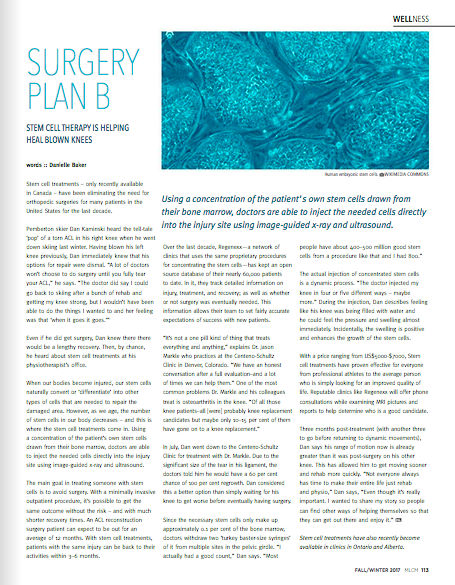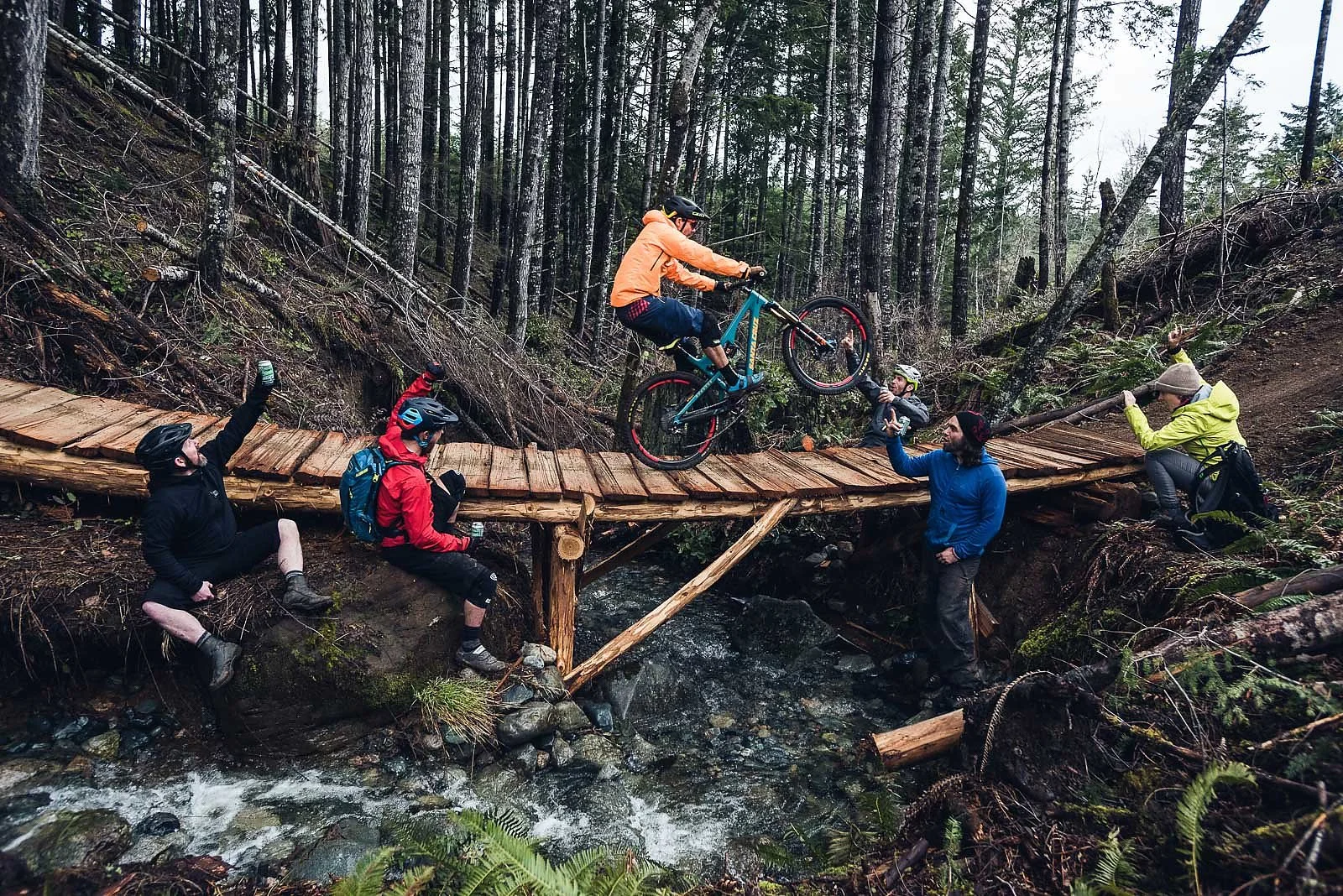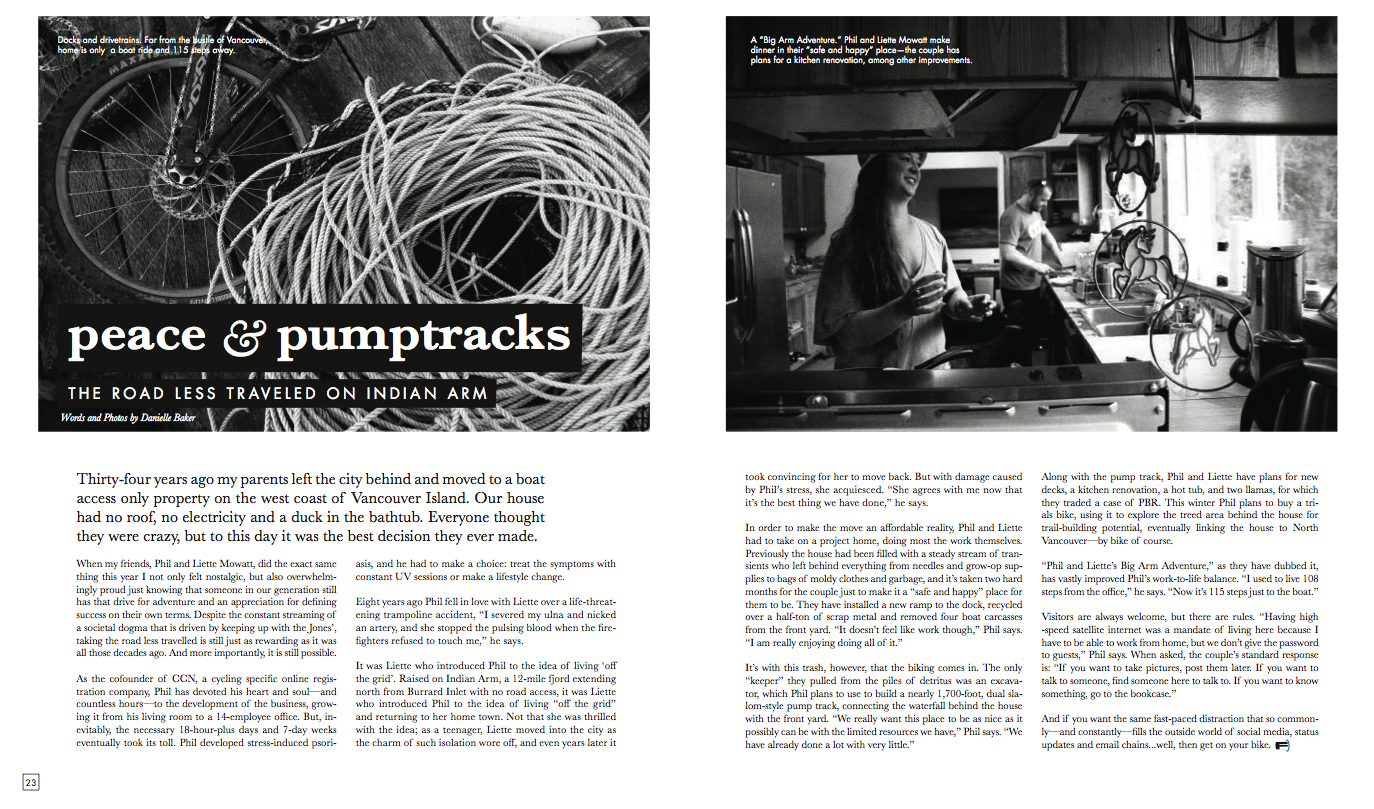Sitting in her kitchen, one of the few rooms of her home that shows no evidence of DIY renovations, Carys Evans sips from a mug made in her basement studio.
Surprisingly, it’s one of few without a feminist theme. She’s reminiscing about her days as the first sponsored female freeride mountain biker. Laughing, she insists on using that title only in the loosest possible sense.
Project Title: Freerider to Feminist
Client: Craft MTN
Sitting in her kitchen, one of the few rooms of her home that shows no evidence of DIY renovations, Carys Evans sips from a mug made in her basement studio.
Surprisingly, it’s one of few without a feminist theme. She’s reminiscing about her days as the first sponsored female freeride mountain biker. Laughing, she insists on using that title only in the loosest possible sense.
The story of Carys’ life bends and weaves along a timeline of bikes, travel, working in the trades, finding her way home in clay and the reclamation of vulgar words. As she speaks, the hands of a clock made from a Volkswagen hubcap tick away above her.

At one time, Norma was heavily engaged in her local mountain bike community as a well-loved and devoted member. Most recently, however, she has emerged as a sought-after skate documentarian committed to highlighting nontraditional people in the space. As a Mexican woman, she’s spent her career drawing on experiences and lessons learned between both sports to increase accessibility for others. The artwork she is gesturing to on her skin signifies the life-changing quick decision that brought her to Canada and kicked off this journey of inclusion through representation.
Project Title: A Place for You
Client: Craft MTN
Norma Ibarra says, laughing as she points to her tattoo of a plaid-shirt-wearing, famously Canadian rodent. Designs weave a tapestry around her arms and legs. The images map her journey from the Sonoran Desert in Mexico to North Vancouver’s forests and now to concrete structures throughout the world.
At one time, Norma was heavily engaged in her local mountain bike community as a well-loved and devoted member. Most recently, however, she has emerged as a sought-after skate documentarian committed to highlighting nontraditional people in the space. As a Mexican woman, she’s spent her career drawing on experiences and lessons learned between both sports to increase accessibility for others. The artwork she is gesturing to on her skin signifies the life-changing quick decision that brought her to Canada and kicked off this journey of inclusion through representation.
Social and mainstream media is awash with stories, slideshows and film clips celebrating “mountain mommas who rip” within weeks, sometimes days, of giving birth. But many new mothers have discovered those back-in-the-saddle success stories are not always the norm. Set up by the expectation of quick and uncomplicated recoveries and hampered by a lack of information available, women looking forward to returning to the sports they love are instead often finding further injury, frustration and depression.
Project Title: Postpartum Expectations
Client: Mountain Life Media
PHOTO: LIIPHOTO.COM
Social and mainstream media is awash with stories, slideshows and film clips celebrating “mountain mommas who rip” within weeks, sometimes days, of giving birth. But many new mothers have discovered those back-in-the-saddle success stories are not always the norm. Set up by the expectation of quick and uncomplicated recoveries and hampered by a lack of information available, women looking forward to returning to the sports they love are instead often finding further injury, frustration and depression.
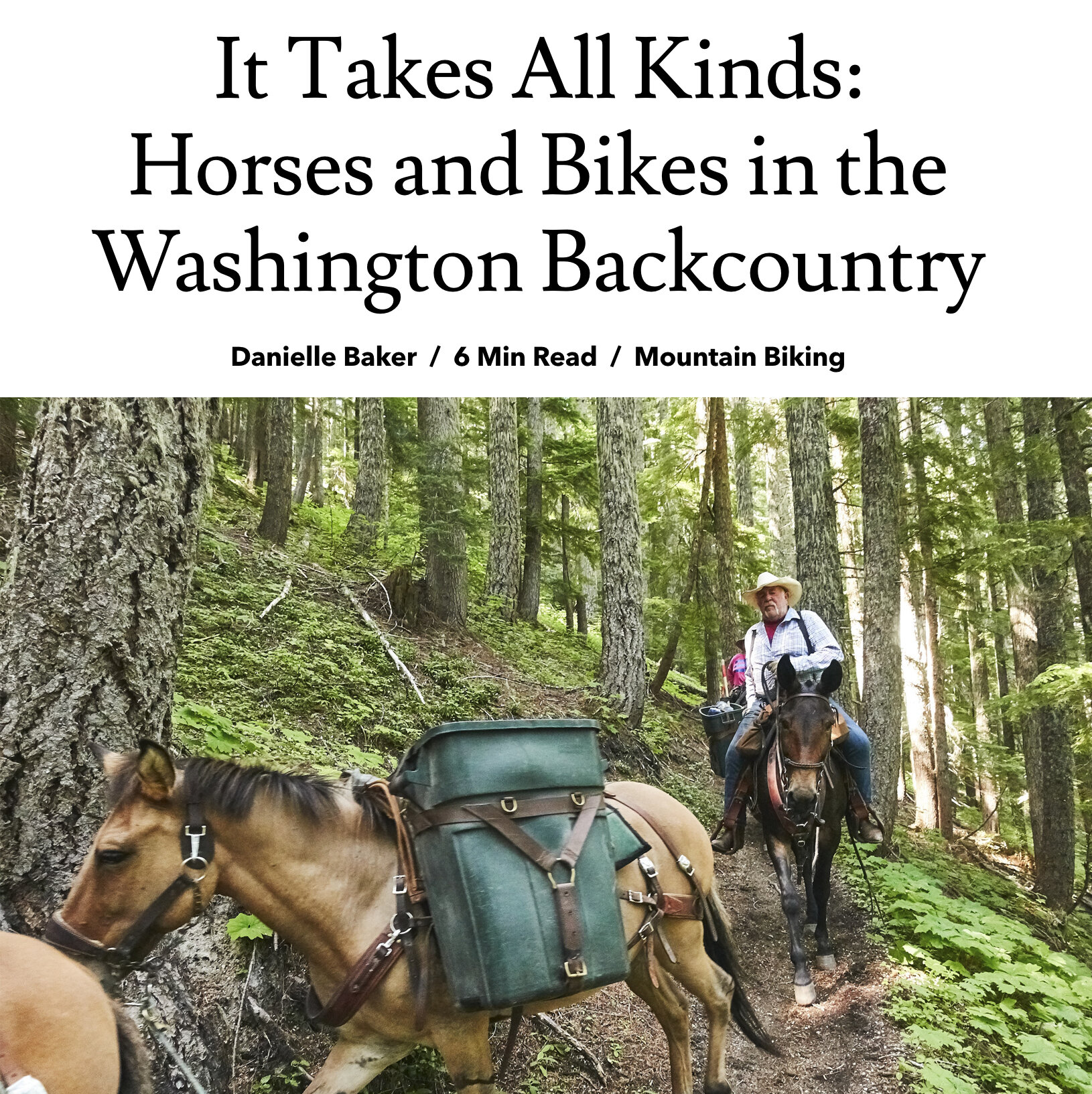
Over the past five years, the Trans-Cascadia has become one of the Pacific Northwest’s most notorious events: a four-day, blind-format, backcountry enduro race, where riders barrel down a course they’ve never ridden, as fast as possible, on some of the region’s most challenging terrain.
Project Title: It Takes All Kinds: Horses and Bikes in the Washington Backcountry
Client: Patagonia
Photo: Chris Hornbecker
Over the past five years, the Trans-Cascadia has become one of the Pacific Northwest’s most notorious events: a four-day, blind-format, backcountry enduro race, where riders barrel down a course they’ve never ridden, as fast as possible, on some of the region’s most challenging terrain.
Trans-Cascadia’s larger mission, however, extends beyond those four fast-paced days. The nonprofit has created a successful model of how to both set up a race and support sustainable trails in the Pacific Northwest, giving back to the local communities on which the event depends.

Traditionally, the time of year between peak seasons in a resort town brings to mind unfavorable weather, closed businesses and maybe even some tumbleweed blowing through the main street.
Whistler, BC, however, has a secret—the shoulder season here is prime time for mountain biking. Summer in Whistler comes to an end with a bang as thousands of people watch the Red Bull Joyride slopestyle contest from the base of the bike park. The competition brings ten days of events, races and festive chaos to a close at the end of August.
Project Title: Quiet & Calm
Client: Freehub Magazine
Traditionally, the time of year between peak seasons in a resort town brings to mind unfavorable weather, closed businesses and maybe even some tumbleweed blowing through the main street.
Whistler, BC, however, has a secret—the shoulder season here is prime time for mountain biking. Summer in Whistler comes to an end with a bang as thousands of people watch the Red Bull Joyride slopestyle contest from the base of the bike park. The competition brings ten days of events, races and festive chaos to a close at the end of August.
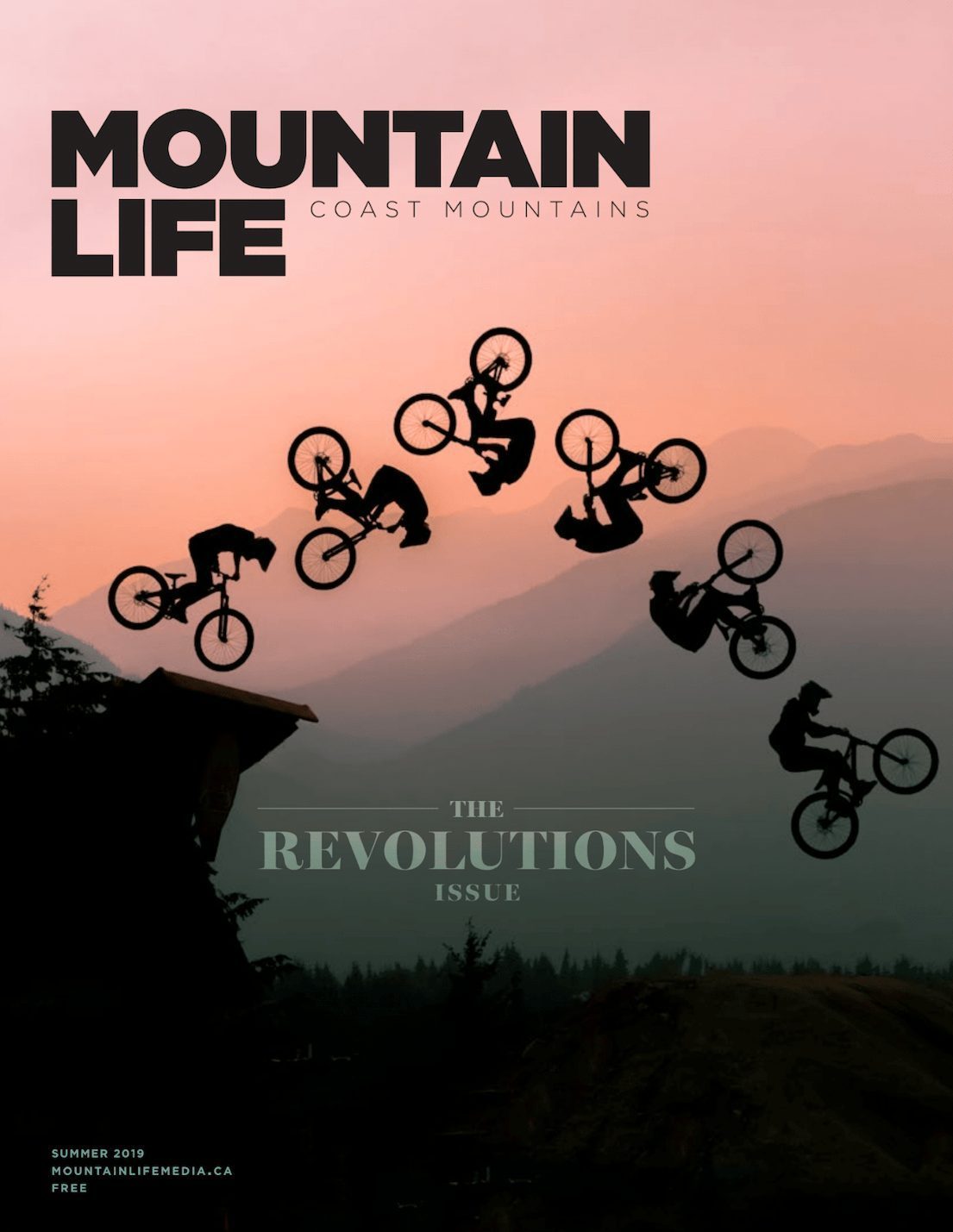
In 1911, 18-year-old Maggie Symonds found herself deposited from a ship on the flat rocks five miles southeast of Pachena Point on Vancouver Island along what is now the world-renowned West Coast Trail. Years later when she recounted her first impression of the uninviting and harsh coastal landscape that would be her home for the next three decades, she remembered thinking, ‘my God, what have I come to?’
Project Title: The Search for Maggie’s Cabin
Client: Mountain Life
In 1911, 18-year-old Maggie Symonds found herself deposited from a ship on the flat rocks five miles southeast of Pachena Point on Vancouver Island along what is now the world-renowned West Coast Trail. Years later when she recounted her first impression of the uninviting and harsh coastal landscape that would be her home for the next three decades, she remembered thinking, ‘my God, what have I come to?’
When I close my eyes, I can see her house. I can trace the swirling patterns of her Battleship linoleum and take in all the turquoise: cupboards, counter, and rotary phone. Her arborite table runs the length of the room and the fridge—an afterthought—sits next to the couch. Looking straight across from the entrance, I can see her photo albums: full of stories, full of life. Pristine in their presentation and complete in their knowledge.
Project Title: (Life)Time Capsules
Client: Mountain Life
When I close my eyes, I can see her house. I can trace the swirling patterns of her Battleship linoleum and take in all the turquoise: cupboards, counter, and rotary phone. Her arborite table runs the length of the room and the fridge—an afterthought—sits next to the couch. Looking straight across from the entrance, I can see her photo albums: full of stories, full of life. Pristine in their presentation and complete in their knowledge.

When Chelsie McCutcheon’s teenage parents brought her home from the hospital in an apple box, they could have easily continued the party lifestyle so readily available to them. Instead, they pursued sobriety. They also made a conscious effort to raise an active daughter who was healthy and connected to the outdoors. Now McCutcheon, who is a member of the Wet’suwet’en Nation, is using outdoor recreation as a holistic tool for positive social change in First Nation communities.
Project Title: All Hail Chelsie McCutcheon
Client: Coast Mountain Culture
When Chelsie McCutcheon’s teenage parents brought her home from the hospital in an apple box, they could have easily continued the party lifestyle so readily available to them. Instead, they pursued sobriety. They also made a conscious effort to raise an active daughter who was healthy and connected to the outdoors. Now McCutcheon, who is a member of the Wet’suwet’en Nation, is using outdoor recreation as a holistic tool for positive social change in First Nation communities.
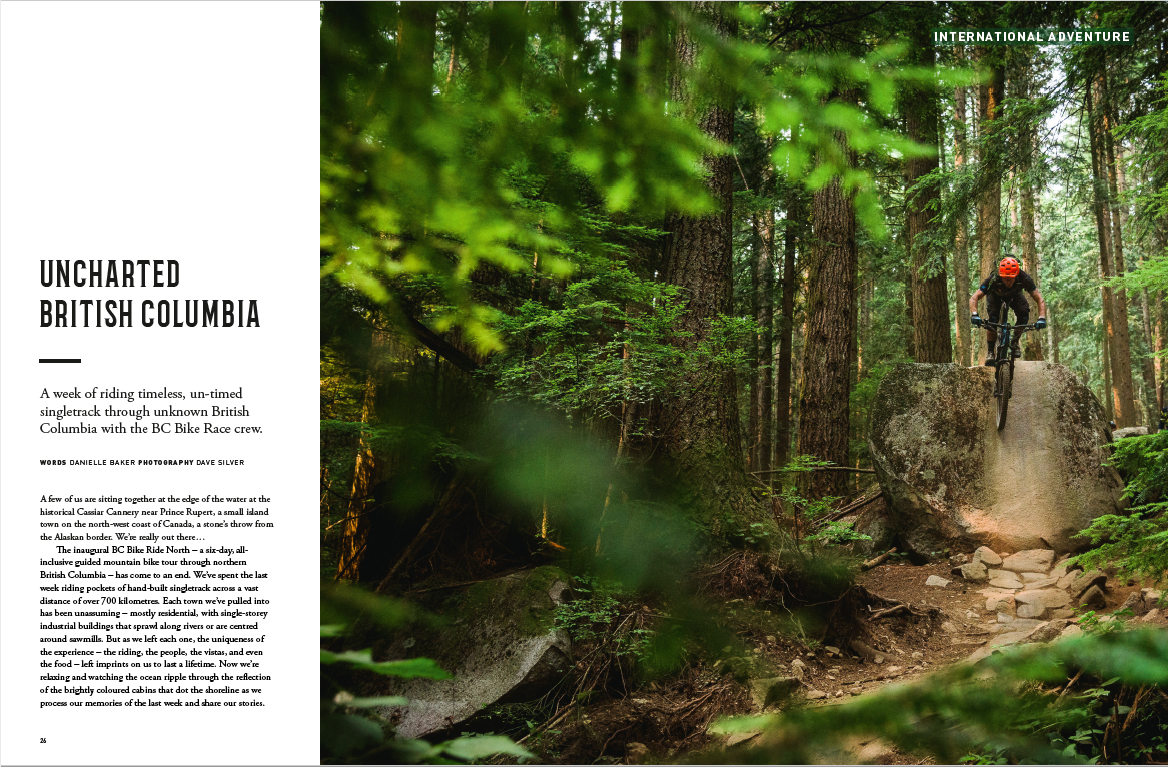
A few of us are sitting together at the edge of the water at the historical Cassiar Cannery near Prince Rupert, a small island town on the north-west coast of Canada, a stone’s throw from the Alaskan border. We’re really out there…
Project Title: Uncharted British Columbia
Client: Singletrack Magazine
A few of us are sitting together at the edge of the water at the historical Cassiar Cannery near Prince Rupert, a small island town on the north-west coast of Canada, a stone’s throw from the Alaskan border. We’re really out there…
"Competing in slopestyle — and a little bit of luck and timing — just naturally led me to where I am today,” he admits in our interview during briefest of breaks between filming in Hawaii and competing in the longest urban downhill race in the world in South America.
Project Title: Carson Storch on his path from slopestyle to freeride mountain biking
Client: Red Bull Canada
"Competing in slopestyle — and a little bit of luck and timing — just naturally led me to where I am today,” he admits in our interview during briefest of breaks between filming in Hawaii and competing in the longest urban downhill race in the world in South America.
Carson Storch never planned on being in Red Bull Rampage. Nor did he plan on pursuing freeride as the main focus of his career.

Since Great-grandmother died in 1976, her presence can still be felt — and often feared. On the Pacific Ocean side of British Columbia’s Vancouver Island, Maggie Logan’s house has been known to freak out intrepid hikers on the West Coast Trail, Canada’s most famous marine hiking route.
Project Title: West Coast Grail
Client: Coast Mountain Culture
Since Great-grandmother died in 1976, her presence can still be felt — and often feared. On the Pacific Ocean side of British Columbia’s Vancouver Island, Maggie Logan’s house has been known to freak out intrepid hikers on the West Coast Trail, Canada’s most famous marine hiking route.

Seven years ago, I sat across from Tara in her wheelchair for our first interview, when she told me unequivocally that she would walk again. Whether it was through sheer willpower or scientific intervention, she was determined to regain what had been taken from her life. Her confidence was so strong that she made me believe it too. And for years Tara poured her heart into making it a reality.
But something has changed.
Project Title: 3847 Days
Client: Eskapee
Seven years ago, I sat across from Tara in her wheelchair for our first interview, when she told me unequivocally that she would walk again. Whether it was through sheer willpower or scientific intervention, she was determined to regain what had been taken from her life. Her confidence was so strong that she made me believe it too. And for years Tara poured her heart into making it a reality.
But something has changed.
Recently I was told a story about a group of guys who had gone to Mexico with their wives. While the men went fishing, the women – who didn’t know each other – were left poolside to bond. I can’t recall what the point of the story was because I fixated on the detail about the women. It struck a familiar cord of anxiety within me. It was the same gut reaction that I have experienced since I was a child and have been forced to socialize based on my genitals, rather than my personality, interests or abilities.
I was seven the first time I was introduced to this stigma. I remember being sat next to a girl while both our moms watched expectantly for our friendship to instantly blossom. I took one look at the bows in her hair and her pink tights under her frilly dress compared to my dirty fingernails, gumboots, and bowl cut and realized it was not going to work. Nope. No way. I got the hell out of there. And I have been running from the stereotype that all vaginas are the same ever since.
Project Title: The Problem with Vaginas
Client: Mountain Life Magazine
Recently I was told a story about a group of guys who had gone to Mexico with their wives. While the men went fishing, the women – who didn’t know each other – were left poolside to bond. I can’t recall what the point of the story was because I fixated on the detail about the women. It struck a familiar cord of anxiety within me. It was the same gut reaction that I have experienced since I was a child and have been forced to socialize based on my genitals, rather than my personality, interests or abilities.
I was seven the first time I was introduced to this stigma. I remember being sat next to a girl while both our moms watched expectantly for our friendship to instantly blossom. I took one look at the bows in her hair and her pink tights under her frilly dress compared to my dirty fingernails, gumboots, and bowl cut and realized it was not going to work. Nope. No way. I got the hell out of there. And I have been running from the stereotype that all vaginas are the same ever since.
It’s stated on our tickets, but when the plane’s wheels touch down, there’s no way to tell what time it is. It could be 7 a.m. Or it could be 7 p.m. That’s because during summer in Whitehorse, the capital of the Yukon, it’s sunny for 19 hours a day.
Project Title: Chasing the Midnight Sun
Client: Freehub Mag
It’s stated on our tickets, but when the plane’s wheels touch down, there’s no way to tell what time it is. It could be 7 a.m. Or it could be 7 p.m. That’s because during summer in Whitehorse, the capital of the Yukon, it’s sunny for 19 hours a day.

Over coffee at her favorite café in Squamish, BC, she shows me some of her recent sketches: quirky squirrels, animated fruit, course maps and illustrated gear lists for past trips she’s taken. Along with being one of the best female mountain bikers in the world, she’s an accomplished designer as well, working on everything from custom helmet bags to Christmas sweaters.
When it comes to biking, however, Jill Kintner needs somewhere to point her wheels.
“I don’t really enjoy riding without direction or purpose,” she says.
Project Title: All the Layers
Client: Freehub Mag
Over coffee at her favorite café in Squamish, BC, she shows me some of her recent sketches: quirky squirrels, animated fruit, course maps and illustrated gear lists for past trips she’s taken. Along with being one of the best female mountain bikers in the world, she’s an accomplished designer as well, working on everything from custom helmet bags to Christmas sweaters.
When it comes to biking, however, Jill Kintner needs somewhere to point her wheels.
“I don’t really enjoy riding without direction or purpose,” she says.

Scrolling through my Instagram feed, Matt Hunter’s images clearly stand out. Not necessarily for what is in them, but more for what is absent. Many of his photos are of beautiful winding singletrack; flowy lines crisply edged with green, weaving through forests and open meadows. They are the kind of trail experience that everyone can get excited about. What’s missing in these photos however, is the rider – Matt, or anyone else for that matter. Matt recalls being inspired by a poster he saw years ago of an empty wave in a restaurant bathroom. “I thought it was so cool. The absence of a surfer left the interpretation up to viewer and their imagination.”
Project Title: The Absent Hunter
Client: Eskapee.com
Scrolling through my Instagram feed, Matt Hunter’s images clearly stand out. Not necessarily for what is in them, but more for what is absent. Many of his photos are of beautiful winding singletrack; flowy lines crisply edged with green, weaving through forests and open meadows. They are the kind of trail experience that everyone can get excited about. What’s missing in these photos however, is the rider – Matt, or anyone else for that matter. Matt recalls being inspired by a poster he saw years ago of an empty wave in a restaurant bathroom. “I thought it was so cool. The absence of a surfer left the interpretation up to viewer and their imagination.”

Stem cell treatments – only recently available in Canada – have been eliminating the need for orthopedic surgeries for many patients in the United States for the last decade.
Dan Kaminski heard the tell-tale ‘pop’ of a torn ACL in his right knee when he went down skiing last winter. Having blown his left knee previously he immediately knew that his options for repair were dismal. “A lot of doctors won’t choose to do surgery until you fully tear your ACL. The doctor did say I could go back to skiing after a bunch of rehab and getting my knee strong, but I wouldn’t have been able to do the things I wanted to and her feeling was that ‘when it goes it goes.’”
Project Title: Surgery Plan B
Client: Mountain Life Magazine
Stem cell treatments – only recently available in Canada – have been eliminating the need for orthopedic surgeries for many patients in the United States for the last decade.
Dan Kaminski heard the tell-tale ‘pop’ of a torn ACL in his right knee when he went down skiing last winter. Having blown his left knee previously he immediately knew that his options for repair were dismal. “A lot of doctors won’t choose to do surgery until you fully tear your ACL. The doctor did say I could go back to skiing after a bunch of rehab and getting my knee strong, but I wouldn’t have been able to do the things I wanted to and her feeling was that ‘when it goes it goes.’”
Project Title: Master of None
Client: Freehub Magazine
I grew up on Vancouver Island and my formative years are something I refer to as B.S.—Before Sport.
Where athletics were concerned, I was a late bloomer. This is why I wanted to return as an adult; to mine the Island for the wide variety of weather conditions and terrain it offers, and for the plethora of activities available with very little travel. For this mission, my hopes were to combine snow, surf, and dirt into one trip, with a crew of people who could hold their own in each discipline and truly appreciate the effort it would take to pull it off—not to mention the luck.

Standing in the middle of the forest on Haida Gwaii is like being the stationary figurine inside a souvenir snow globe. The moist air swirls around you, whipping raindrops and pine needles sideways and up, while the ocean, crested with foaming whitecaps, maintains a barrier to the rest of the world. There is a stillness that grounds you, and a peacefulness that this isolation in space creates. It is no wonder we were drawn here.
Project Title: What Really Matters
Client: Eskapee
Standing in the middle of the forest on Haida Gwaii is like being the stationary figurine inside a souvenir snow globe. The moist air swirls around you, whipping raindrops and pine needles sideways and up, while the ocean, crested with foaming whitecaps, maintains a barrier to the rest of the world. There is a stillness that grounds you, and a peacefulness that this isolation in space creates. It is no wonder we were drawn here.

I was a child when my aunt said to me, “I never get depressed. Whenever I wake up in a bad mood I just decide to be in a good mood.” While on the surface it sounds like a beautiful prescription for living, that is likely when the stigma surrounding depression first took hold in my subconscious. Depression is a weakness and you can choose not to have it. That stigma – not the depression itself – almost killed me.
Project Title: I Wanted to Die
Client: Eskapee
I was a child when my aunt said to me, “I never get depressed. Whenever I wake up in a bad mood I just decide to be in a good mood.” While on the surface it sounds like a beautiful prescription for living, that is likely when the stigma surrounding depression first took hold in my subconscious. Depression is a weakness and you can choose not to have it. That stigma – not the depression itself – almost killed me.
In the modern age of globalization, of social media feeds saturated with far-flung expeditions, the definition of “adventure” has changed. A true adventure, we’re told, requires plane rides or elaborate travel plans, to places hundreds of miles and thousands of dollars away. To experience something new we need to leave and go someplace, some “elsewhere,” where the exotic is lurking to blow our minds.
Project Title: The Backyard Backcountry
Client: Freehub Magazine
In the modern age of globalization, of social media feeds saturated with far-flung expeditions, the definition of “adventure” has changed. A true adventure, we’re told, requires plane rides or elaborate travel plans, to places hundreds of miles and thousands of dollars away. To experience something new we need to leave and go someplace, some “elsewhere,” where the exotic is lurking to blow our minds.

The looming gnarled giants stretch up overhead from the spongy earth under our feet, their lush and dense branches filtering sunlight as it trickles down to us and our inhalations slow and deepen in the cool, damp air. This is what we come here for. Whether consciously acknowledged, or compelled by an unknown yet innate sense of longing and need, we find ourselves in the forest.
Project Title: Spirit Forest
Client: Rocky Mountain Bicycles
The looming gnarled giants stretch up overhead from the spongy earth under our feet, their lush and dense branches filtering sunlight as it trickles down to us and our inhalations slow and deepen in the cool, damp air. This is what we come here for. Whether consciously acknowledged, or compelled by an unknown yet innate sense of longing and need, we find ourselves in the forest.

There are two big disappointments in Adrian Mar- coux’s world: how much electricity a toaster uses and the lack of a window over his sink.
Whether there is enough power for the appliance or warm water in the sink can depend on a number of things. It could be the temperature—at minus 4 degrees [Celcius] the water pipe feeding his miniature hydropower plant and house faucets will freeze, meaning no electricity and no running water. It could be leaves obscuring the intake spout on Skookum Creek. Or it could be the placement of a Troy Lee jersey stretched over a collection barrel as a silt deflector.
Project Title: A Conscious Choice
Client: Freehub Magazine
There are two big disappointments in Adrian Mar- coux’s world: how much electricity a toaster uses and the lack of a window over his sink.
Whether there is enough power for the appliance or warm water in the sink can depend on a number of things. It could be the temperature—at minus 4 degrees [Celcius] the water pipe feeding his miniature hydropower plant and house faucets will freeze, meaning no electricity and no running water. It could be leaves obscuring the intake spout on Skookum Creek. Or it could be the placement of a Troy Lee jersey stretched over a collection barrel as a silt deflector.

The reward of getting the shot isn’t always just in the completion of the task for a photographer, but instead can lie in the satisfaction of overcoming the challenges and struggles needed to achieve it. For Margus Riga the spoils are often in simply surviving his own methods.
Project Title: The Opposite of Control
Client: Rocky Mountain Bicycles

For my grandmother, adventure wasn’t something to be revered or praised, or even sought after. It was simply a day-to-day inevitability. It also happened to include killing fish with a club, paddling her canoe during flood season, and skinny dipping in the frigid waters of Nitinat Lake.
Project Title: Genetic Inevitability
Client: Freehub Magazine
The remote forests of British Columbia’s Sunshine Coast have always been unique. Stretching more than 100 miles along the eastern shores of the Strait of Georgia, the coast and its towering old growth is inaccessible from the greater mainland. To the north and south, it’s cut off by Desolation and Howe sounds; to the east, blocked by the rugged wall of the Coastal Mountains.
And yet, despite their remoteness, for centuries those vi- brant forests—and the Coast’s namesake 281 annual days of sun—have drawn whole populations and industries. First, it was the cedar totem poles and canoes of the local Squamish (Skwxwú7mesh), Sechelt (Shíshálh), and Sliammon (Tla’Amin) First Nations. Next, the lonely trappers and fur traders of the Hudson’s Bay Company’s glory days. Finally, the waves of ravenous loggers arrived, changing the face of the landscape and spotting the shorelines with communities that survive to this day.
Project Title: Forest Progression
Client: Freehub Magazine
The remote forests of British Columbia’s Sunshine Coast have always been unique. Stretching more than 100 miles along the eastern shores of the Strait of Georgia, the coast and its towering old growth is inaccessible from the greater mainland. To the north and south, it’s cut off by Desolation and Howe sounds; to the east, blocked by the rugged wall of the Coastal Mountains.

Thirty-four years ago my parents left the city behind and moved to a boat access only property on the west coast of Vancouver Island. Our house had no roof, no electricity and a duck in the bathtub. Everyone thought they were crazy, but to this day it was the best decision they ever made.
When my friends, Phil and Liette Mowatt, did the exact same thing this year I not only felt nostalgic, but also overwhelmingly proud just knowing that someone in our generation still has that drive for adventure and an appreciation for defining success on their own terms. Despite the constant streaming of a societal dogma that is driven by keeping up with the Jones’, taking the road less travelled is still just as rewarding as it was all those decades ago. And more importantly, it is still possible.
Project Title: Peace & Pumptracks
Client: Freehub Magazine
Thirty-four years ago my parents left the city behind and moved to a boat access only property on the west coast of Vancouver Island. Our house had no roof, no electricity and a duck in the bathtub. Everyone thought they were crazy, but to this day it was the best decision they ever made.
When my friends, Phil and Liette Mowatt, did the exact same thing this year I not only felt nostalgic, but also overwhelmingly proud just knowing that someone in our generation still has that drive for adventure and an appreciation for defining success on their own terms. Despite the constant streaming of a societal dogma that is driven by keeping up with the Jones’, taking the road less travelled is still just as rewarding as it was all those decades ago. And more importantly, it is still possible.

At 19 I found myself newly surrounded by the daily chaos of life in a densely populated city.
I had just moved to Vancouver, BC, uprooting myself from a small town to this metropolis of towering high rises, one of which could have housed all the citizens of my hometown of Bamfield. It seemed ironic that I’d be lonely surrounded by more people than I had probably seen in my previous 20 years. But I was.
Project Title: Within Our City Limits
Client: Freehub Magazine
At 19 I found myself newly surrounded by the daily chaos of life in a densely populated city.
I had just moved to Vancouver, BC, uprooting myself from a small town to this metropolis of towering high rises, one of which could have housed all the citizens of my hometown of Bamfield. It seemed ironic that I’d be lonely surrounded by more people than I had probably seen in my previous 20 years. But I was.

When I started writing in 2012 it was completely by accident. I had sent something I had written off to a friend who worked at Bike Magazine asking for an opinion, that same day I received a response from their web editor asking me to start writing weekly for them - and that is how The Bakery came to be. I wrote the column for a year on bikemag.com and have written it for pinkbike.com now since 2014 (briefly under the title: The B-Side). You can find all the articles I've written under this title - the good, the bad, the ugly, and the sometimes controversial - by following the link below.
Project Title: The Bakery
Client: Pinkbike.com (currently)
When I started writing in 2012 it was completely by accident. I had sent something I had written off to a friend who worked at Bike Magazine asking for an opinion, that same day I received a response from their web editor asking me to start writing weekly for them - and that is how The Bakery came to be. I wrote the column for a year on bikemag.com and have written it for pinkbike.com now since 2014 (briefly under the title: The B-Side). You can find all the articles I've written under this title - the good, the bad, the ugly, and the sometimes controversial - by following the link below.

The genesis for
#TeamCoast2Coast
in this year’s Wings for Life World Run started with an induction into a club.
“I heard you just got inducted into the most elite club in the world, the spinal cord injury club,” begins a text message that Mike Shaw, former professional freestyle skier based in British Columbia, received in 2013 after his injury.
Project Title: Various
Client: Red Bull Canada
I started working for Red Bull as a freelance writer in 2018. Since then I have worked on multiple projects including short form content, long form articles and interviews, and event coverage.

I started working for Pinkbike as a freelance writer in 2014. Since then I have written columns; The B-Side and The Bakery, reported from Rampage annually, interviewed top athletes and industry leaders, and travelled to discover bike culture internationally. For all of those stories (there are many) you can follow the link below.
Project Title: Various
Client: Pinkbike.com
I started working for Pinkbike as a freelance writer in 2014. Since then I have written columns; The B-Side and The Bakery, reported from Rampage annually, interviewed top athletes and industry leaders, and travelled to discover bike culture internationally. For all of those stories (there are many) you can follow the link below.



